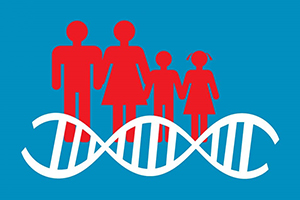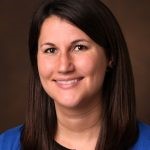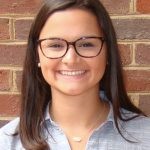Vanderbilt Kennedy Center (TN IDDRC, UCEDD, LEND) Introduces Genetic Counseling to its LEND Curriculum, Welcomes First Trainee from Inaugural Genetic Counseling Master's Program
January 20, 2020

|
Vanderbilt Kennedy Center's (TN IDDRC, UCEDD, LEND) Consortium LEND has seen a lot of change this year, including the installment of a new director, new program staff members, and growth within its cohort at East Tennessee State University. Among the changes is the addition of the genetic counseling discipline to LEND's Care Navigation practicum, thanks to LEND faculty member Laura Duncan, M.S., CGC, as well as its first long-term trainee from Vanderbilt's inaugural Master of Genetic Counseling program, Gianna Petrelli.
 "Laura Duncan has been a fantastic contributor to LEND, not only in her knowledge of genetics but also in her assistance in developing and managing the Care Navigation practicum," said Evon Batey Lee, Ph.D., Vanderbilt Consortium LEND director. "She has a gift for making information accessible and conversing with the trainees with good humor."
"Laura Duncan has been a fantastic contributor to LEND, not only in her knowledge of genetics but also in her assistance in developing and managing the Care Navigation practicum," said Evon Batey Lee, Ph.D., Vanderbilt Consortium LEND director. "She has a gift for making information accessible and conversing with the trainees with good humor."
"I have been involved with the LEND program since I started at Vanderbilt in 2014. During this time, I have grown as a professional," said Duncan. "I have been able to use some of the teaching styles I've seen in LEND-case examples, open-ended discussions, small group breakouts to large group discussions-in the development of the courses I have been involved in with our new Master of Genetic Counseling Program. I have also been able to develop my leadership skills by serving as an example for the trainees and walking them through the concepts presented."
Duncan and the LEND team took a year to brainstorm and test out the Care Navigation portion of the LEND curriculum with feedback from the trainees to further fine-tune the lesson structure. Duncan also worked with the trainees to orient them to the role of a Care Navigator and their role as a LEND trainee who is serving as a Care Navigator.
"When we have our trainees work with individuals with disabilities and their families, they are able to apply the concepts they learn in class and will be able to see a different perspective of these concepts. It will help them understand a family's journey in navigating the medical, educational, and therapy systems and provide the trainees with insight on how to navigate the systems themselves."
Genetic counseling is a specialization that bears a lot of significance, particularly when working with a population of people with disabilities. There are intellectual and developmental disabilities such as Down syndrome or Rett syndrome which are triggered by genetic variation, and sometimes knowing and understanding the genetic structures of a patient can indicate specific interventions that would improve his or her life outcome.
"We interact with people with or at risk for genetic conditions every day," said Duncan. "Adding a genetic counseling trainee to the LEND curriculum will hopefully help other trainees understand the role of genetics not only on the individual level but on the larger scale, for example public health initiatives, utilization, and community impact. We hope to provide insight to the trainees on the diagnostic journey some individuals may go on for themselves or their children related to a genetic diagnosis."
 And, on the flip side, interacting with other trainees from varying disciplines
And, on the flip side, interacting with other trainees from varying disciplines
has helped long-term trainee and Genetic Counseling master's student Gianna Petrelli expand her understanding of the team dynamic that's so important when treating and serving individuals with disabilities.
"LEND has provided an amazing opportunity to gain exposure to the various healthcare professions with which I'll be working on an interdisciplinary team in order to treat patients," said Petrelli. "I have gained a vast understanding of the roles each of these healthcare professionals play throughout a patient's diagnostic odyssey and treatment. Oftentimes, genetic diagnoses come with a myriad of referrals to other specialties, and because of LEND, I feel as if I have a deep understanding of what patients will face while working with other specialties and while seeking treatment before and after genetic testing."
"This specialty is incredibly relevant for LEND since one main focus is on serving individuals with neurodevelopmental disabilities and their families," said Evon Lee. "So many families ask questions about the etiology of their child's developmental disability and the recurrence risk. These are just a couple of areas where genetic counseling can be invaluable. The more health care and educational perspectives that our LEND trainees can be exposed to,-the better prepared they will be to be leaders in their respective fields."
Petrelli has jumped headlong into the trainee experience, even serving the Association of University Centers on Disabilities (AUCD) as this year's trainee liaison for the VKC's UCEDD and LEND training programs. Through this role, she will work with other trainee liaisons from universities with Centers on Disabilities to identify strategies to improve networking between fellow VKC LEND and UCEDD trainees and other AUCD-based trainees across the country.
"Through genetic counseling, I want to have a holistic understanding of the social, educational, and medical aspects of each patient while working through family histories and testing," said Petrelli. "I have a particular interest in public health and policy, and LEND has connected me through many trailblazing individuals in the Vanderbilt Kennedy Center who serve in many different advocacy roles on the community, state, and national level. I have been very grateful that LEND has facilitated these relationships, as many of these relationships have informed my education and even my thesis project."
For more information about the Master of Genetic Counseling Program, click here. Elizabeth Turner is associate director of VKC Communications.







